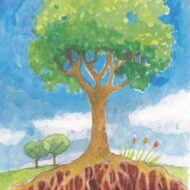I had a little bit of a melt down in the car the other day. It was a highly scheduled day from one appointment to another. Suddenly a wave of sadness and anger swept through me (fortunately I wasn’t driving).
What are we doing to ourselves? As a culture, why are we allowing ourselves to live this way? (and then the real melt down) Why in the world are we forcing our children to live this way? Why are we reinforcing a system (schools, education, over scheduling extracurricular activities) that shuffles kids from one place to another, cramming information in and then shifting to the next topic… just like our adult lives? Where did we get the crazy idea that this is good for their development? That this is good for our development?
{sigh}
There is a woman in my life from whom I am learning so much. This professionally successful woman in her late 40’s began to recognize that she is a workaholic. I am constantly inspired by the ways in which she has accepted this new awareness and turned her attention towards a difficult practice of re-prioritizing where she expends her time and energy.
One realization that she made that has become etched inside my own brain is that “More protected time equals more productive time.” Finding a balance is essential.
At one level I see this as the huge need for protected time that is spent in non-work domains of life, playing, eating meals, being with friends and family, reading, getting bored, thinking, wondering and dreaming, staring out the window, breathing, resting, walking, riding a bike, meditating, laughing, going for a drive in the country, getting lost, being creative, etc. When we allow ourselves the time and space for such protected, unstructured and expansive activities, we rejuvenate ourselves and deepen our connections with our self, others, our environment, nature, and life. Consequently, we also deepen our capacities for fully utilizing our resources when applied to the work at hand.
Another way that we can honor the mantra that more protected time equals more productive time is to protect the time designated as productive time. We can do this by being mindful of how we engage. How are we doing what we’re doing?
Janette Girod writes about being in flow, a state and practice that integrates protected and productive time into a way of being that serves both the individual and the work as a whole. She offers ways for bringing more attention and mindfulness into the actions that we do. Below are some scattered quotes from her inspiring article:
“Attention is key to your experience of life; how much you get out of any activity is directly related to how much attention you pay to it in the moment.
Mihaly Csikszentmihaly goes even further, arguing that “it is the full involvement of flow, rather than happiness, that makes for an excellent life.”
Your ability to concentrate can be trained, just as your body can. It is a slow, incremental process, and just like with physical training, the real gains are made through consistency rather than occasional bursts.
It is easy, as soon as the mind starts to wander or a problem seems too messy to deal with, to switch gears and distract yourself with email or irrelevant tasks. This is exactly the moment when you should remind yourself to engage fully with your stated task. Don’t sabotage yourself!
As soon as you notice your mind start to wander, use that as a trigger to remind yourself to refocus on your work. Your mind, by nature, needs to be occupied with something. The closer attention you pay to your chosen task, the less energy you’ll need to spend to keep your mind from wandering.”
It can take great courage and the diligence to stay with the task at hand when your mind is urging you to turn your attention somewhere else, to do something more interesting, to take a break, (or if it is the break you are focusing on, to keep working).
A quote from No End, No Beginning: The Intimate Heart of Zen, by Jakusho Kwong Roshi addresses the arduous task of staying with the pressure that emerges when the mind wants one thing and the practice demands another:
“…the first teacher you will meet at a Zen center is the schedule. No matter what you may want to do or not do, the schedule provides a kind of natural pressure that pushes you past your hindrances, past your ideas of yourself and your fears or inhibitions…All of this pressure begins to accumulate like frost gathering on snow; it functions like the pressure that transforms coal into diamond.”
I find it so interesting that on one level many of us could benefit from feeling more pressure in regards to being mindful with our work, inviting more discipline into the activities that we bless with our attention on a daily basis. And on another level, we could also benefit from allowing ourselves to feel the pressure that comes when we decide that it’s time to stop working and to turn our attention in a different direction. Allowing the pressure to build, and thus the stress to release, potentially effecting our beliefs in a system that drives us from one scheduled event to another and keeps our children trapped in institutions that neglect some of the most important elements of their development, playing and unstructured time.
Thank you Chris and Christy for links and quotes… and you for reading my rant!
